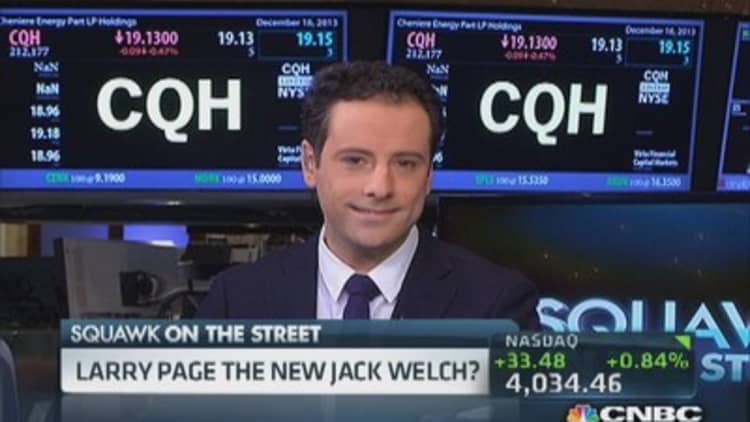Google just bought Boston Dynamics, maker of giant robots Big Dog and Wild Cat, adding to its arsenal of self-driving cars and Google glasses.
This puts Google in the pantheon of conglomerates like General Electric, United Technologies,and even Berkshire Hathaway.
And that's a good thing! Conglomerates are one of the best sectors this year, up about 30 percent.
It's hard to argue that robots are a natural extension of Google's existing business lines, but they do offer tremendous growth. I think that drones and robots will play a more visible role in daily life in the next five to ten years, and no doubt Internet-connected software will play a part in that. And thus, Google is positioning itself for growth.
Google's expertise in software and the internet can be applied to a broad array of investment areas just as GE's six sigma management is applied to the variety industries it operates in. Especially as "software eats the world"), you could argue that being good at software means you are good at just about any business.
(Read more: )
And conglomeration for Google answers the growth imperative and provides a place to invest its capital. Unlike the challenge Apple faces with an ever expanding mountain of cash, Google can keep investing in new fields that leverage its very broadly defined expertise.
And with the time horizon for disruption getting shorter and shorter, this diversification ensures that Google has new businesses to compete in before they are fully formed. Self-driving cars, Google Glass, and robots in daily life may seem far-fetched today, but in a decade, they may be as common as the things today that a decade ago would have generated wonderment.
(Read more: Here's what the 2014 tech IPO pipeline looks like)
Peter Thiel famously said, "We wanted flying cars, instead we got 140 characters." With Google, we have a company that is using the cash cow of search to go after the "flying car"-type businesses that may be mainstream in a decade.

When I was in business school, we were taught that investors preferred pure-play businesses to conglomerates. Investors wanted to do their own diversification, and diversification was not the job of the company. However, conglomeration may be an effective way to achieve big technical disruption and big investment for big ideas.
We see this, too, with Amazon, where Jeff Bezos recently explained to 60 Minutes: "Companies come and go. And the companies that are, you know, the shiniest and most important of any era, you wait a few decades and they're gone ... I would love for it to be after I'm dead."
(Read more: 3-D gifts for do-it-yourselfers)
Like Google, Amazon has gone after substantial diversification — most famously into Amazon Web Services, it's cloud-based storage and computation services. But now, the company is going into drone experimentation as well. One could argue that these are more closely tied together than robots are for Google. But at it's core, Amazon is broadly diversifying to future-proof itself.
Conglomeration, or businesses diversifying in broad ways that leverage some basic competency, may be the way for businesses to cross the chasm of big change. "Conglomerate" may soon be a word and strategy that we hold in as high esteem or consider to be synonymous with growth.
—By Jon Steinberg
Jon Steinberg is the president & chief operating officer of BuzzFeed and is responsible for all business management, company operations, finance, and social advertising operations. Follow him on Twitter @jonsteinberg.
Disclosure: Google, GE, and Amazon are BuzzFeed advertisers.

